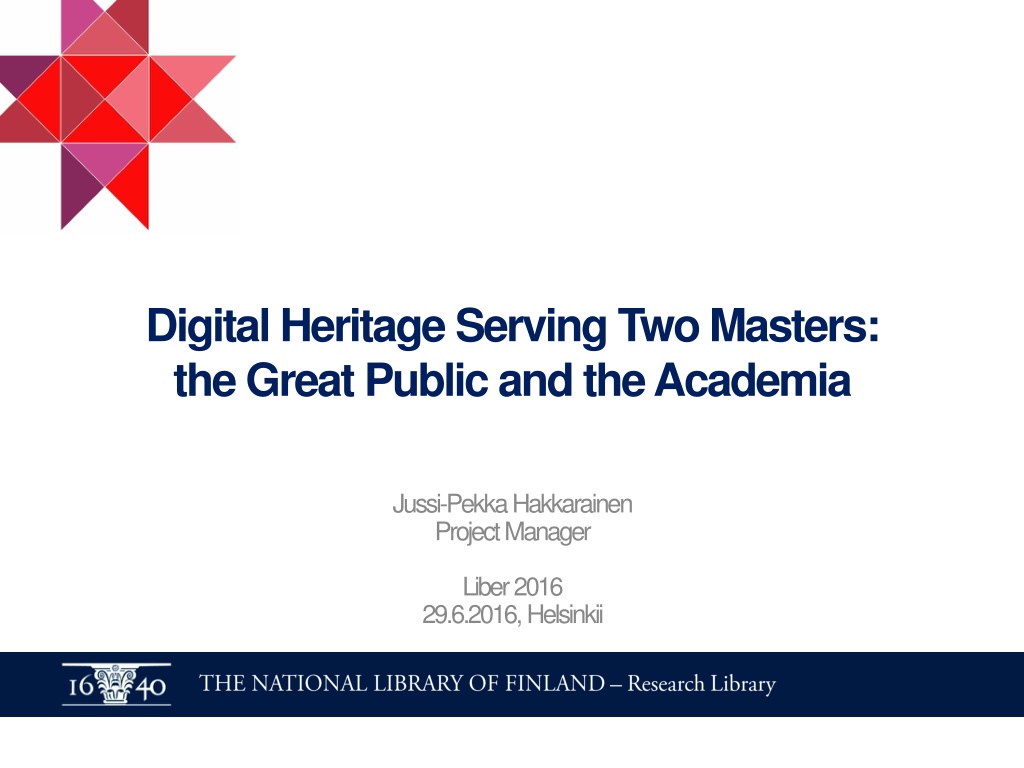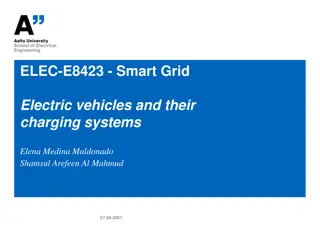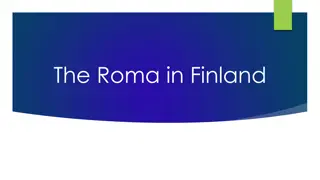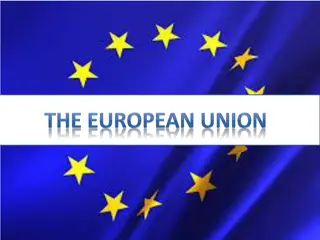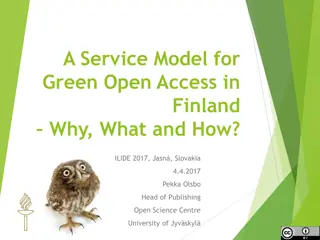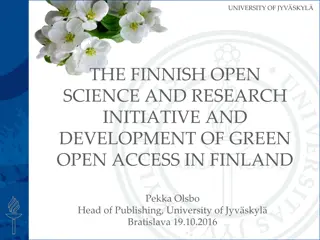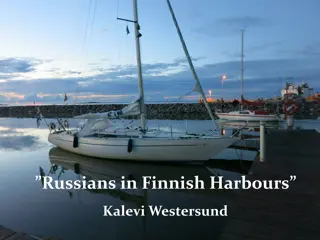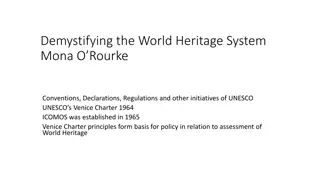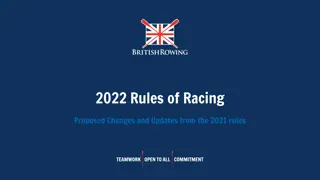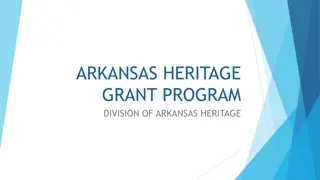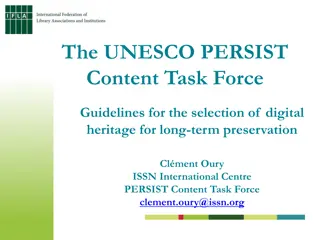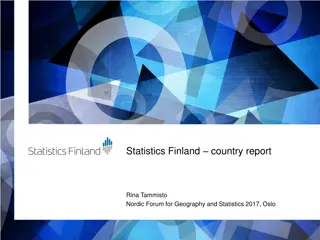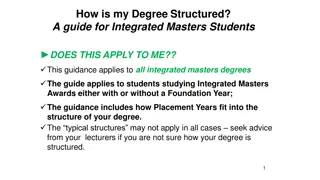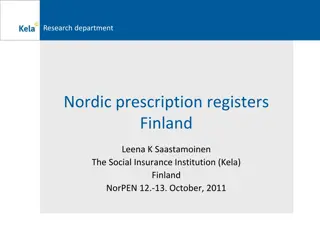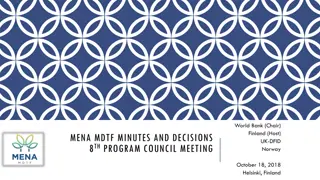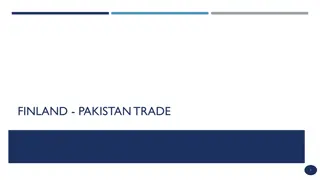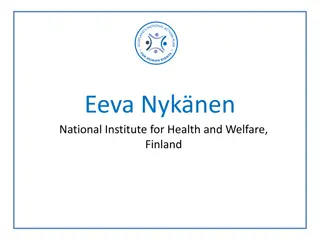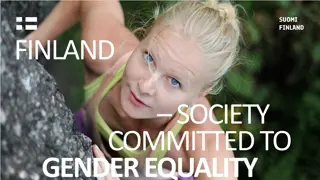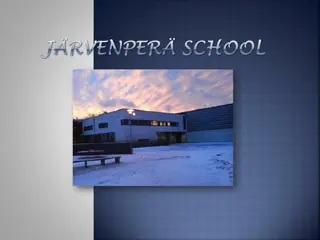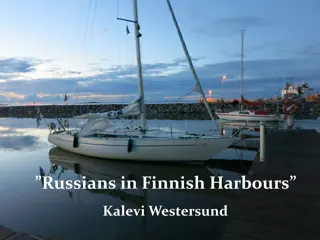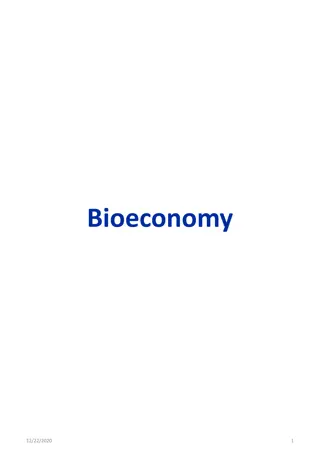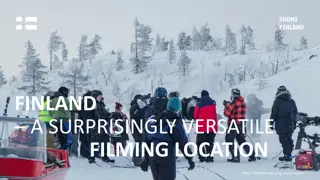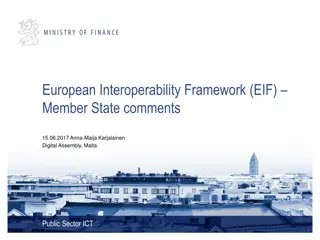Digital Heritage: Serving Two Masters in Finland
The National Library of Finland has undertaken the Minority Languages Project to digitize materials in Uralic languages, supporting linguistic research and citizen science. The project aims to bridge gaps in linguistic research and provide open access to valuable cultural content. Through collaboration with academia, the project has successfully engaged researchers in decision-making and distribution of data.
Download Presentation

Please find below an Image/Link to download the presentation.
The content on the website is provided AS IS for your information and personal use only. It may not be sold, licensed, or shared on other websites without obtaining consent from the author.If you encounter any issues during the download, it is possible that the publisher has removed the file from their server.
You are allowed to download the files provided on this website for personal or commercial use, subject to the condition that they are used lawfully. All files are the property of their respective owners.
The content on the website is provided AS IS for your information and personal use only. It may not be sold, licensed, or shared on other websites without obtaining consent from the author.
E N D
Presentation Transcript
Digital Heritage Serving Two Masters: the Great Public and the Academia Jussi-Pekka Hakkarainen Project Manager Liber 2016 29.6.2016, Helsinkii
Overview of the Project The National Library of Finlandhas been implementing the Minority Languages Project since 2012. Within the project we have digitized materials in 17 Uralic languages as well as developed tools to support the 1) linguistic research and 2) citizen science. Through this project, 1) researchers would gain access to new corpora which they have not been able to study before and to which 2) all users would have open access regardless of their place of residence.
Materials and Collection Within the project, National Library of Finlandhas digitized and published around 1150 monograph titles and more than 100 newspapers titles in 18 Uralic languages. The online collection, Fenno-Ugrica, will consist of 110,000 monograph pages, 150,000 newspaper and journal pages as well as some manuscripts. All in all, ca. 30 000 items were published. The majority of materials belong to the collections of the National Library of Russiain Saint Petersburg.
The Content Aim to digitize items which would precisely fill the gaps in linguistic research and in corpora, vocabularies etc. After 1917, the languages were converted into a medium of popular education, enlightenment and dissemination of information pertinent to the developing political agenda of the Soviet state. The deluge of literature in 1920s-1930s suddenly challenged the lexical orthographic norms of the limited ecclesiastical publications from the 1880s. New concepts were introduced in the language. This was the beginning of a renaissance and period of enlightenment.
Languages of Publications Scandinavia Russian Federation Europe https://commons.wikimedia.org/wiki/File:Linguistic_map_of_the_Uralic_languages_%28en%29.png By Maximilian D rrbecker
Engaging the Academia Key factor for success was the engaging the researchers to the project. The researchers were in the loop from the very beginning, even before the money was raised. Researchers did participate in Planning Decision-making Communications Networking Distribution of data
Selection Criteria of Material The selection of the materials has been made in co-operation with the researchers and we used several criteria upon the selection of material: genesis and consolidation period of literary languages availablility of material in Finnish libraries and institutions online access to collections in Russia locality the languages of peripheries are more tempting cost efficiency loads of parallel titles (translations) No-one else would digitize and publish this material!
Researchers and Decision-making Once the money was granted, we called researchers to the steering group, so they were part of decision-making. In addition to that, the meetings with the researchers in the field took place, both formally and informally: Coffee sessions with the Helsinki-based researchers on the weekly basis Annual meetings to discuss about the needs within the Academia Participating the seminars, congresses, workshops etc. Forcing them to communicate on our behalf.
Researchers and Networking The participation of researchers and the co-operation with the researchers took off once we got the reputation. 2 projects in 2012 7 projects and 2 institutions in 2013 4 PhD students, 11 projects, 4 NGOs and 8 institutions in 2015.
Datasets and Further Use We have created the data ourselves and released the data for other operators in Fenno-Ugricaas wordlists > raw data for linguistic solutions like online dictionaries, spell-checkers, corpora etc. Edited material is available also in Korp, which is the concordance search tool of the Finnish Language Bank. Some parts of available also at Giellateknoof Arctic University of Norway and Institutf rDeutsche Spracheand FU-Lab in Syktyvkar, Komi Republic (Russia)
Finding the Language Communities How to locate people who could use the content for their benefit? Co-operation with universities and libraries didn t really work out Activity in English-oriented social media did not help us No remarkable networking, contact or results via WWW, Twitter, Facebook or Project Blog No interactivity with native-speakers
Language Communities, ie. The Great Public When thinking of the possible wider audiences, one must bear in mind that the most of the people, who speak these languages are located in Russia. Communication and marketing Schedule for blog posts and Vkontakte messages Accessible user interface for Russian-speaking audience Fenno-Ugrica, Uralica Activitity in social media in Russian is necessary Vkontakte Chat forums (for linguists etc) IRC channels
Some Conclusions Involvement of the researchers did build up our reputation, but only among the academia. The great audience was reached with the help of social media. One cannot underestimate its power. We benefitted on this in several ways. More active and returning users, more audience and more opportunities to find suitable user-groups etc. Increased co-operation with Russian institutions (when speaking Russian) Makes our work open and understandable for the great audience.
Contact Details jussi-pekka.hakkarainen@helsinki.fi @hakkarainen fennougrica.kansalliskirjasto.fi blogs.helsinki.fi/fennougrica
